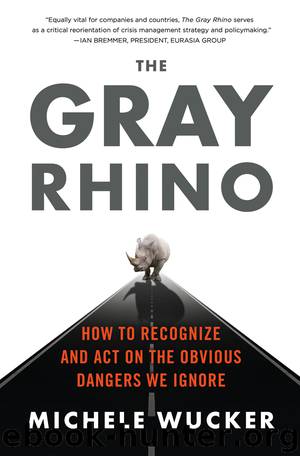The Gray Rhino by Michele Wucker

Author:Michele Wucker [Wucker, Michele]
Language: eng
Format: epub, azw3
ISBN: 9781466887008
Publisher: St. Martin's Press
Published: 0101-01-01T00:00:00+00:00
The Best and the Worst
Decision-making at times of high stress brings out the best and the worst in leaders. Memory improves, senses sharpen, adrenaline rushes as we go into overdrive. But we lose the opportunity to consider unintended consequences, costs, and benefits—and to reason through. The preparation we’ve done ahead of time makes all the difference.
Facing a threat head on, the decisions we make are distinct from the ones we make from a distance, given the luxury of time that allows us to reason through responses and solutions. This is the difference between the kind of thinking that the behavioral economist Daniel Kahneman calls System 1 (the intuitive, subconscious, snap decisions we make on the turn of a dime) and System 2 (the reasoned, logical processing we do when we have the luxury of time). Using Kahneman’s framework, in situations of imminent threat we need to find ways to override System 1 and put in place structures that (ideally) we’ve employed System 2 to create ahead of time.
How well we deal with an imminent threat depends on the organizational strategies we set up in advance. While breaking up groupthink is the key to recognizing Gray Rhinos early on, there is evidence that in responding to crises it helps to have a tight, centralized decision-making structure.
Researchers at the Moynihan Institute of Global Affairs at the Maxwell School of Public Service at Syracuse University have assembled a database of past crises that crossed borders, and look in greater depth at eighty-one such crises around the world. They further grouped these events into those with more or less of an element of surprise, and the amount of time leaders had to deal with them. The 1997 Thailand currency crisis, the Waco Branch Davidian disaster, and NATO’s response to the Kosovo crisis were among the thirty-nine cases judged to have been anticipated, to some extent, with an extended decision-making frame; the Exxon Valdez and the 1975 attack on the SS Mayaguez, off the coast of Cambodia, were among the seven decision-making frames that were short, but still anticipated crises. Among the thirty-one “surprise” events were things like the fall of Alberto Fujimori in Peru and the 1990 Gulf War over an extended time period; the DC anthrax attacks, the Madrid Bombing, and the Federal Aviation Administration’s response to 9/11 were short-term surprise events.
The Moynihan Institute team found that in hindsight decision-makers were more satisfied with their choices when they faced a time-urgent crisis than when they had more time to consider various options. In the “anticipated” situations, 64 percent of policymakers with relatively more time to prepare and 55 percent with less time judged themselves to have been unsuccessful. In the “surprise” situations, 53 percent of policymakers viewed themselves as moderately or highly successful.
Why would this be? The Moynihan Institute political scientists Margaret Hermann and Bruce W. Dayton suggest that decision-makers are happier with choices they made themselves. “The data suggest trans-boundary crises that are anticipated by policymakers are generally unlikely to also be viewed as time urgent,” they concluded in a paper summarizing the crisis research.
Download
This site does not store any files on its server. We only index and link to content provided by other sites. Please contact the content providers to delete copyright contents if any and email us, we'll remove relevant links or contents immediately.
| Anthropology | Archaeology |
| Philosophy | Politics & Government |
| Social Sciences | Sociology |
| Women's Studies |
The Secret History by Donna Tartt(19046)
The Social Justice Warrior Handbook by Lisa De Pasquale(12186)
Thirteen Reasons Why by Jay Asher(8890)
This Is How You Lose Her by Junot Diaz(6875)
Weapons of Math Destruction by Cathy O'Neil(6264)
Zero to One by Peter Thiel(5786)
Beartown by Fredrik Backman(5737)
The Myth of the Strong Leader by Archie Brown(5496)
The Fire Next Time by James Baldwin(5429)
How Democracies Die by Steven Levitsky & Daniel Ziblatt(5213)
Promise Me, Dad by Joe Biden(5141)
Stone's Rules by Roger Stone(5080)
A Higher Loyalty: Truth, Lies, and Leadership by James Comey(4950)
100 Deadly Skills by Clint Emerson(4919)
Rise and Kill First by Ronen Bergman(4778)
Secrecy World by Jake Bernstein(4740)
The David Icke Guide to the Global Conspiracy (and how to end it) by David Icke(4699)
The Farm by Tom Rob Smith(4502)
The Doomsday Machine by Daniel Ellsberg(4484)
